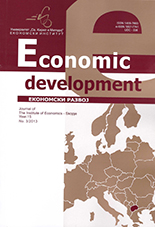Empirical analysis of FDI and tax incentives on the economic growth in Republic of Macedonia
Empirical analysis of FDI and tax incentives on the economic growth in Republic of Macedonia
Author(s): Elizabeta Dzambaska Subject(s): Economy
Published by: Економски институт - Скопје
Keywords: neoclassical growth model; tax incentives; foreign direct investment; economic growth; Republic of Macedonia
Summary/Abstract: Theoretical approach for this analysis is the new growth theory and extended Solow’s model. This paper analyses the effects of investment and fiscal policy measures as determinants of total factor productivity in the Republic of Macedonia. The empirical analyses are conducted using the data for capital, labor, gross investment, FDI and tax revenue as determinants of economic growth in the Republic of Macedonia in the past period. Multiple linear regressions analysis used quarterly data for the period 2005-2011. The calculations of statistical parameters are obtained by software package XLSTAT 2012.The results show that foreign direct investments are not statistically significant. Although various fiscal measures create favorable conditions for foreign investors, these are not the source of economic growth in the Republic of Macedonia. Gross investments are those that increase the constant level of capital in the country and they are of particular importance for economic growth. The impact of taxes and contributions is positive and statistically significant. This is peculiar due to the low level of taxes that should reflect into long-term declining trend, but could be explained with the specific circumstances over the analyzed period.
Journal: Економски Развој - Economic Development
- Issue Year: 15/2013
- Issue No: 3
- Page Range: 103-127
- Page Count: 25
- Language: English

